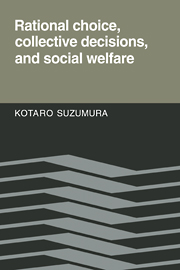Book contents
- Frontmatter
- Contents
- Preface
- Chapter 1 Prologue
- Chapter 2 Rational choice and revealed preference
- Chapter 3 Arrovian impossibility theorems
- Chapter 4 Simple majority rule and extensions
- Chapter 5 The fairness-as-no-envy approach in social choice theory
- Chapter 6 Impartiality and extended sympathy
- Chapter 7 Individual rights and libertarian claims
- Chapter 8 Epilogue
- Notes
- Bibliography
- Index
Chapter 1 - Prologue
Published online by Cambridge University Press: 07 October 2011
- Frontmatter
- Contents
- Preface
- Chapter 1 Prologue
- Chapter 2 Rational choice and revealed preference
- Chapter 3 Arrovian impossibility theorems
- Chapter 4 Simple majority rule and extensions
- Chapter 5 The fairness-as-no-envy approach in social choice theory
- Chapter 6 Impartiality and extended sympathy
- Chapter 7 Individual rights and libertarian claims
- Chapter 8 Epilogue
- Notes
- Bibliography
- Index
Summary
[T]he social order is a sacred right which serves as a foundation for all other rights. This right, however, since it comes not by nature, must have been built upon convention. To discover what these conventions are is the matter of our inquiry.
Jean-Jacques RousseauThe problem of rule selection
In trying to lay the foundations of the new welfare economics, J. R. Hicks brought forward the following problem:
Although the economic system can be regarded as a mechanism for adjusting means to ends, the ends in question are ordinarily not a single system of ends, but as many independent systems as there are “individuals” in the community. This appears to introduce a hopeless arbitrariness into the testing of efficiency [of any given economic organization]. You cannot take a temperature when you have to use, not one thermometer, but an immense number of different thermometers, working on different principles, and with no necessary correlation between their registrations. How is this difficulty to be overcome?
[Hicks, 1939, p. 699]According to Hicks, there are three possible ways of dealing with this problem:
Instead of using the preference scales of the individuals in the community, the investigator may use his own “thermometer,” that is, decide for himself what is good or bad for society in judging the relative performances of the alternative economic organizations.
The investigator may seek a method of aggregating the (possibly) conflicting reports of the various thermometers so as to construct an “average” or “social” registration.
[…]
- Type
- Chapter
- Information
- Publisher: Cambridge University PressPrint publication year: 1983



